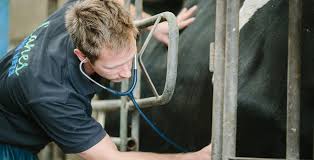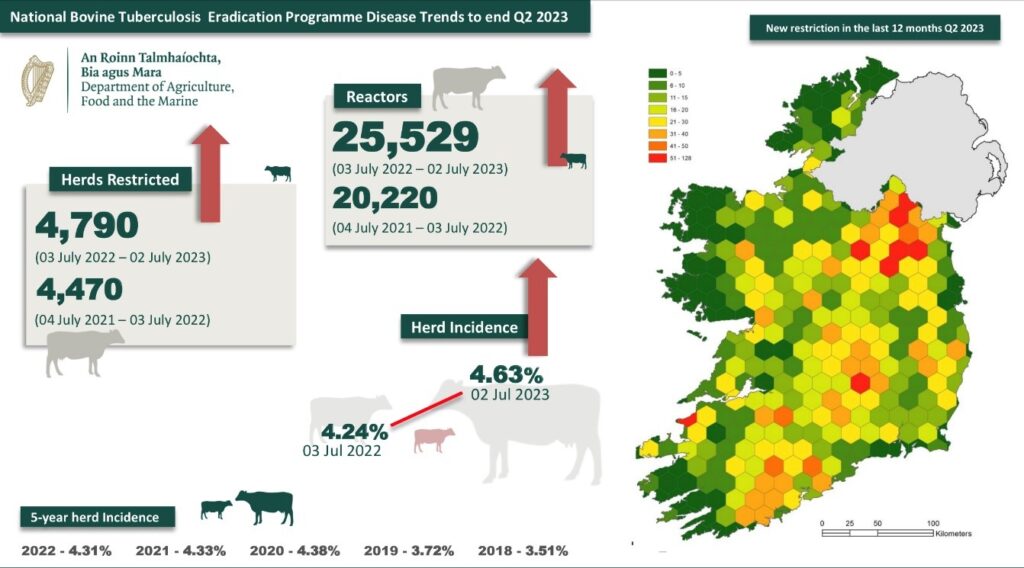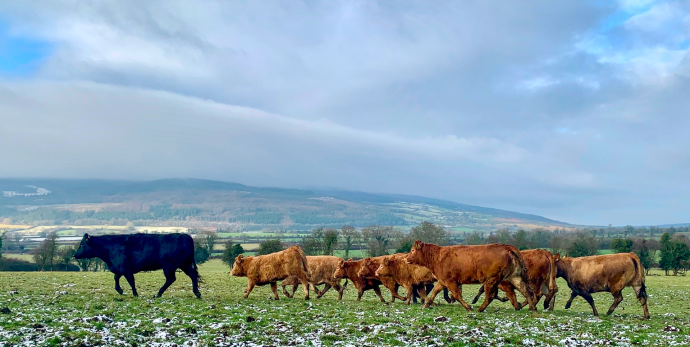Animal Health Council Report July 2023

- Disease Trends
Current TB Statistics

Current BVD Statistics
| 12/07/2023 | ||||||||||||
| 2013 | 2014 | 2015 | 2016 | 2017 | 2018 | 2019 | 2020 | 2021 | 2022 | 2022- Week 28 | 2023- Week 28 | |
| Tested | 2,095,779 | 2,131,898 | 2,264,667 | 2,325,031 | 2,347,307 | 2,347,313 | 2,345,975 | 2,382,606 | 2,430,514 | 2,432,220 | 2,060,142 | 2,043,092 |
| Negative | 98.03% | 98.54% | 98.85% | 99.20% | 98.85% | 98.58% | 98.96% | 99.10% | 99.21% | 98.90% | 98.96% | 98.98% |
| Positive | 0.77% (16,191) | 0.50% (10,758) | 0.36% (8,246) | 0.20% (4,540) | 0.12% (2,843) | 0.07% (1,531) | 0.05% (1,111) | 0.03% (807) | 0.03% (810) | 0.03 (750) | 0.02 (449) | 0.03 (532) |
| Inconclusive | 0.03% (661) | 0.01% (119) | 0.01% (207) | 0.00 (59) | 0.01% (118) | 0.00% (47) | 0.00% (15) | 0.00% (15) | 0.00% (5) | 0.00% (5) | 0.00% (4) | 0.00% (9) |
| Empty | 1.13% (23,751) | 0.92% (19,675) | 0.73% (16,632) | 0.59% (13,719) | 1.01% (23,712) | 1.33% (31,119) | 0.94% (22,087) | 0.82% (19,425) | 0.73% (17,704) | 1.04% (25,403) | 0.99% (20,378) | 0.98% (20,100) |
| BVD+ | 0.66% (13,877) | 0.46% (9,733) | 0.33% (7,427) | 0.16% (3,808) | 0.10% (2,397) | 0.06% (1,325) | 0.04% (987) | 0.03% (724) | 0.03% (788) | 0.03% (707) | 0.02% (410) | 0.02% (467) |
| Recorded Dead | 100% (13,876) | 100% (9,733) | 100% (7,427) | 100% (3,808) | 100% (2,397) | 100% (1,325) | 100% (987) | 100% (724) | 100% (788) | 100% (707) | 95.6% (392) | 94% (439) |
| Positive Herds | 11.27% (8,936) | 7.63% (6,060) | 5.9% (4,597) | 3.26% (2,504) | 2.05% (1,514) | 1.16% (840) | 0.8% (575) | 0.6% (415) | 0.55% (381) | 0.45% (307) | 0.34% (219) | 0.31% (184) |
| Herds Retaining | 0.00% (0) | 0.00% (0) | 0.00% (0) | 0.00% (0) | 0.00% (0) | 0.00 (0) | 0.00 (0) | 0.00% (0) | 0.00% (0) | 0.00% (0) | 0.01% (4) | 0.01% (6) |
| Negative Herd Status | N/A | N/A | N/A | N/A | N/A | N/A | N/A | N/A | N/A | N/A | 78,191 | 77,812 |
BVD Maps 2013 and 2023 (to June 30th)


- Activity since last National Council
Animal Health Committee Meetings
- The upcoming meeting of the National Animal Health Committee is scheduled to take place at the Irish Farm Centre on Thursday, August 3rd, 2023.
TB
TB Forum
- On July 7th, 2023, the TB Forum convened. Attendees at the meeting discussed disease trends, whole genome sequencing, and quantifying the impacts of recent policy changes to the programme.
TB Implementation Working Group Meetings
- The TB Implementation Working Group has met twice since the last report, on May 2nd, 2023, and July 11th, 2023. During these meetings, the Implementation Working Group reviewed disease trends, wildlife programme figures, risk mitigation plans, TB herd oversight, and received a communications update from the communications sub-group.
- DAFM have proposed changes to the High-Risk TB breakdown herd categorisation in line with IFA demands for change in this area.
- Herds must now have 3 or more TB reactors to be classified as High Risk.
- This will significantly reduce the numbers of breakdown herds entering the ‘check test protocol’ and critically will reduce the number of herd involved in contiguous testing programme by approx. 50%.
- The most recent TB Implementation Working Group meeting featured presentations from Tralee Regional Veterinary Offices, sharing interesting case studies from their area. The Implementation Group has now heard from Mayo, Louth/Meath, Donegal, and Tralee RVOs.
Wildlife
| 2023 Q1 | Year On Year Change | |
| Removed | 2426 | +195 |
| Vaccinated | 4560 | +1023 |
| Total | 7286 | +1218 |
Communications Sub-Group Meetings
- On June 16th, 2023, the Communications sub-group held a meeting. They are currently conducting a review of the overall communication documents issued to farmers regarding TB, including the Risk Mitigation Plans.
Deer Management Strategy Group
- IFA nominated representatives for all subgroups of the Deer Management Strategy Forum, from the Animal Health committee, the Hill committee and the Forestry committee.
- These subgroups encompass Venison, Collaboration, Training & Education, Solutions for Land Management, and Legislation.
- Three were accepted by the Deer Management Forum, TJ Maher for Training & Education, Amanda Mooney for Solutions for Land Management, and Michael Davoren for Collaboration.
- All subgroups have conducted multiple meetings and are reporting back to the Forum.
- The Deer Management Strategy Group intends to submit their findings based on the subgroup discussions to the government in time for the 2024 Budget decisions.
- The next stakeholder meeting of the Forum is expected in late August/early September.
- IFA met with the chairman of the Forum to ensure the mandate of the Forum is delivered on, which is the reduction of the Deer population nationally.
- This will require a formal legislatively based structure with responsibility for deer management and the funding necessary to carry out the action of reducing deer numbers.
BVD
BVD Implementation Group Meetings
- The BVD Implementation Group has met twice since the last report, on May 25th, 2023, and July 6th, 2023.
- IFA supports the objective of achieving BVD Free Status, recognizing the benefits and the significant investment of over €100 million by farmers to date in the programme.
- IFA has outlined key points that should form the basis for the remaining part of the BVD Programme, including:
- DAFM should must fund the BVD programme from 2024 onwards.
- Once freedom is achieved, the testing and surveillance required to maintain ongoing freedom should be fully funded by the Department of Agriculture.
- The testing approach should provide early case detection to safeguard the status achieved by farmers.
- Farmers subjected to controls due to confirmed cases must receive full support for the cost and impact of these controls.
- In late December 2022, the Minister announced €2.25 million for the BVD Programme for 2023.
- Discussions are on-going in relation to the programme for 2024.
IBR
- Discussions have begun on the design of a National IBR programme.
- A proposed programme by AHI includes a cost of €40 million per year and a 16-year timeline for achieving eradication, along with strict movement controls on farms.
- The impact of IBR on dairy farms has been estimated at €88 million per year, with no assessment conducted for suckler and beef farms.
- The funding model remains a critical issue to be addressed in order to advance the programme.
Veterinary Medicine
- IFA continues to engage with stakeholders, including prescribers, suppliers, and veterinarians, regarding the Veterinary Medicinal Products, Medicated Feed, and Fertilizers Regulation Bill 2023, aiming to find a satisfactory solution for all parties.
- The IFA maintains a longstanding policy supporting the usage of veterinary medicines on farms, recognizing their vital role in meeting animal health and welfare legislative obligations and maximizing the productive capacity of animals. Access to these products in a competitive market is crucial for farmers.
- The IFA fully supports the targeted and appropriate use of veterinary medicines and actively participates in stakeholder groups, including the Antiparasitic Stakeholder Group, established by the Minister for Agriculture to achieve this objective at the farm level.
- Upcoming issues
- Ongoing high-level negotiations regarding technical aspects of the TB Programme.
- Continued review of all communications related to the TB programme.
- Review of fallen animals’ collection services.
- Ongoing participation in the Deer Management Strategy Group to address the overpopulation of deer in Ireland.
- Veterinary Medicines.
- Development of the IBR Programme.
- Animal Health Committee Budget Submission
Best practice disease control and medicine usage on farms needs direct support
- To improve the health status of the national herd, an overarching animal health programme for all farmers is needed. This programme must directly support farmers in implementing best practice disease prevention and targeted medicines usage on farms. It must also recognize the on-farm costs and additional labour requirements associated with applying these practices on the farm throughout the year.
IFA Proposal
- While the TASAH Parasite Control Programme is a first step, it fails to directly support farmers for participation. This programme must be built on and provide farmers with direct financial incentives and supports to deliver the programme on their farms. Such incentives will encourage farmers to participate in the programme and ensure that the health status of the national herd continues to improve.
VAT Rate on Vaccines
- The current VAT rate is 23%, farmers spend over €40m on vaccines annually. The implementation of a 0% VAT rate would result in over €10m direct savings for farmers and an increased usage of vaccines as part of herd health plans.
IFA Proposal
- The VAT rate on vaccines and other associated important on farm medicines where VAT is currently charged must be reduced in 2024 to the 0% rate.
Regional Veterinary Laboratories
- In 2019, €33.5m was allocated for a 10-year programme to enhance the Regional Veterinary Laboratory Network and associated services to farmers. It has been 4 years since the commitment was made and no infrastructural development or enhancement of services to farmers has been visible.
IFA Proposal
- The €33.5m allocation for the upgrading of the Regional Veterinary Laboratory network must be utilised and the monies utilised immediately to enhance the services to farmers.
TB
Wildlife Control Programme Resources
- Additional funding has been committed to the Wildlife Control Programme but has not delivered the level of increase in staff resources on the ground to implement the programme in the timely and efficient manner required to make a meaningful impact on TB levels.
IFA Proposal
- The additional funding allocations to the programme must be utilised in full to provide a doubling of the staff resources carrying out the programme on the ground.
Communication with herdowners
- Analysis of the DAFM queries annually show the vast majority of queries from herd owners relate to TB despite less than 5 % of farmers experiencing disease restrictions annually. This clearly highlights the need of farmers in this area and significant improvements to the current offering must be provided. A single point of contact for farmers during a TB outbreak has been committed to and must become a reality for farmers on the ground.
IFA Proposal
- All farmers in a TB breakdown must be provided with direct contact details for an individual dealing with their herd who has knowledge of all aspects of the TB programme to ensure the stress and trauma of the event are reduced by having access to all of the information relevant to their situation when needed.
Farmer liability in Payment for TB Testing
- Farmers have a long-standing agreement with Government in relation to payment for TB testing on their farms.
- The agreement requires farmers to pay for one full herd a year at no shorter interval than 10 months, all other legislatively required testing is paid for by the Department of Agriculture. New legislative requirements relating to TB testing in the EU Animal Health Law are part of this agreement and must be honoured by Government.
IFA Proposal
- Government must honour the long-standing agreement in relation to payment for TB testing, any additional legislatively required testing must be paid for in full by the Department of Agriculture, this includes the current pre/post movement 30-day test.
National Deer Management
- The increasing uncontrolled deer population in Ireland is undoubtedly causing widespread issues across Ireland. While road traffic accidents and biodiversity loss are major causes for concern among farmers and the general public, farmers are those most affected directly by the uncontrolled increase in the deer population which has been allowed to occur over the last number of years. The Irish Deer Management Forum aims to address the concerns relating to the overpopulation of deer. The IDMF must be fully supported by the Government to deliver on the objective of reducing the national deer population to a level that is sustainable within its own natural habitat which does not extend to farmers lands.
IFA Proposal
- Government must provide the funding and resources necessary to deliver the strategy that will be developed by the IDMF.
BVD
- The BVD programme has been in place voluntarily since 2012 and compulsively since 2013, costing over €100m, all contributed directly by farmers. While the programme is on track to achieve its objective of eradicating BVD, farmers have been the key contributors in funding and programme implementation. As we approach the attainment of recognised BVD Free Status under the EU Animal Health Law, it is a critical time for AHI and its credibility with farmers.
- The future credibility of AHI and its ability to deliver across numerous other existing programme areas is dependent on a satisfactory conclusion from a farmer’s perspective to the BVD programme. It is therefore imperative that achieving the BVD Freedom milestone brings immediate change for farmers in their experience of the programme.
- In this regard issues such as the type and frequency of testing come under review. The most effective case detection method is Tissue Tag Testing. Achieving the milestone of recognised eradication of the disease has come at a huge cost to farmers and it is vital this status would be protected and farmers see the long-term benefits. To ensure this and in order to have confidence in stepping down vaccination, which is a requirement of the existing EU Animal Health Law, the prudent approach is to continue tissue tag testing for a period of time.
- The fundamental change that farmers must see in the BVD programme is the removal of the direct costs of BVD sampling and testing. The higher-level national surveillance, proof of freedom, in the Bovine Viral Diarrhoea (BVD) programme that will commence on attainment of free status must be fully funded by DAFM. This approach is consistent with the publicly stated Department of Agriculture policy of cost and responsibility sharing in disease control. Farmers have made their direct and indirect contribution to this programme since 2012, delivered on the objectives of the programme, and it is now time for the Government to acknowledge their achievements and make their contribution. The beneficiaries who have not incurred any BVD programme costs to date should be recognized. The estimated cost of this is €10m in the first year, reducing annually as the TWG profile the likely risk herds.
IFA Proposal
- The Department of Agriculture must fund the full cost of all BVD testing requirements and associated control costs from 2024.
Johnes
IFA Proposal
- The Department of Agriculture funding and resource commitment to the programme must be extended and built on to help drive participation.
IBR
- The proposed IBR Programme is predicted to cost €40m/annum and run for a minimum of 16 years bringing the predicted total for the programme to €640m and requiring movement controls if the 16-year timeline is to be met. The mistakes and funding inequities of other AHI disease eradication/control programmes cannot be repeated in the proposals for a National IBR programme.
IFA Proposal
- A funding model must be established that recognises all beneficiaries of a national IBR programme. The level of funding that will be available through this model must be established in the first instance to inform the design of a programme and the approach to be taken. Government must outline the level of funding they are prepared to provide for a national IBR programme.
Fallen Animals
- EU Regulation requires the Department of Agriculture to provide the infrastructure for farmers to meet their legal obligations in relation to fallen animal disposal.
- The current infrastructure provided by DAFM does not provide a guaranteed collection service for all farmers in the country and fails to have a competitive cost structure for the service. Despite DAFM providing direct subvention to Fallen Animal Collectors under a scheme that has maximum fees allowable to be charged to farmers DAFM have no inspection system in place for compliance with this requirement.
- The current system is failing to deliver on its objectives through a combination of Department of Agriculture failures in the construct of the system and oversight of the subvention criteria.
IFA Proposal
- The entire fallen animal disposal system must be reviewed and the most efficient system that delivers guaranteed collection of fallen animals to all farmers in the country at competitive rates provided.



